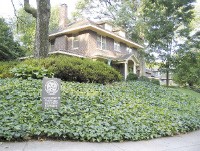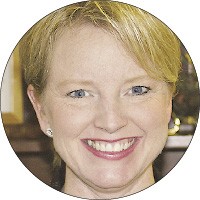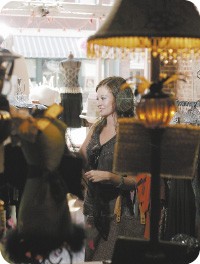Condo or traditional home? It’s not exactly an age-old question in Memphis. Even as recently as 10 years ago, it wasn’t a very common thing to consider. But the intervening years have been very kind for condominium development in Memphis, especially downtown. The fact is that nowadays in Memphis, “condo or traditional home” is one of the first Greg Cravens
Greg Cravens
things prospective homeowners need to consider when deciding about how best to spend their money and live their lives. As new condo developments shoot up like brick and glass flowers across the urban garden of downtown Memphis, the question that once was wasted breath now is essential.
House ownership offers wonderful potential for home gardening.
If there can be said to be a wrong answer to the question, it’s an answer strictly to be determined on a person-by-person basis. Be they financial, investment, or lifestyle considerations, it’s important for each buyer to understand what the different benefits of condo and traditional-home ownership are.
One of the initial things a prospective buyer will want to determine is what they can afford to buy. Sam Goff, director of marketing and a residential mortgage loan officer at Memphis-based Evolve Mortgage and host of WREC-AM 600’s House Calls: All Things About Mortgages, advises potential buyers to consider the mortgage payments of a traditional home versus a condo. Is there a difference between the mortgage payments for each? On the surface, no. Goff says, “If someone’s going to qualify for a $200,000 home, they’re going to qualify for a $200,000 condominium.” However, when calculating potential mortgage payments, it’s necessary that prospective condo buyers build homeowner-association fees into what they will be paying each month. Goff says, 
Downtown condo owners can experience similar sensations in public parks such as the Mud Island Greenbelt.
“A [traditional] home will not have association fees. It’s not unusual for association fees for a [condo] development to be $400-500 a month. That’s a little more strain on the debt ratio. And it could be that the prospective owner would not qualify because of their debt ratio.”
The homeowners’ association is one of the key characteristics in the mix when considering purchasing a condominium versus a traditional home. Investment-wise, the quality of the association will go a long way in determining future returns. Goff says, “The biggest danger in a condo is that the homeowners’ association isn’t strong and they let the place get rundown.” A prospective buyer should ask to see the association bylaws and “stipulations for what people can and can’t do,” Goff says. “One of the greatest sources of protection that any buyer can have is to check into the homeowners’ association.”
Tobey Hubbard, a partner in Blackstar Capital Partners, a real estate private-equity firm that is invested in downtown Memphis, agrees. A strong homeowner’s association “protects everybody’s value and protects the integrity and consistency of the development,” Hubbard says.When you purchase a condominium, you are buying everything inside your four walls. Everything else is considered common area.
There’s typically a condo association board that will “think proactively about ways to enhance the character or value of the property,” Hubbard says. On the condo association board, he 
Sam Goff
adds,”everybody’s got a voice. If you own a unit, you’ve got a vote. And you’ve got a venue to express concerns and a governing body that can vote on that. It’s a fairly democratic situation.”
The idea of a monthly association fee might be troubling to some prospective condo owners. Don’t let it be, says Hubbard: “Those expenses that make up your monthly maintenance fee in any condo project are the same expenses that you’re going to pay for in a single-family home. The largest line-item [of a fee] is insurance. If you own a single-family home, you’ve still got to pay for that.” 
In a condominium development, the homeowners’ association pays for property and liability insurance (as provided for in the association fees), and the homeowner is responsible for insuring the contents of their home and liability within their personal space. It means two policies for the condo owner rather than the one that a traditional-home owner has. But there’s no significant difference in pricing, Hubbard says.
Maintenance fees covered by the homeowner’s association pay for new roofs, painting, and repairs and are paid on a monthly basis rather than as a lump-sum as problems arise, as is the case with traditional-home ownership. Hubbard says, “Everybody [in a condo] is paying these fees, and they expect these fees to be allocated … and spent toward the greater good of everybody in the condominium development.”
Pam McCarthy has owned a condo unit at Whispering Oaks in East Memphis for over two years. It’s the first home she’s owned. When she was making the decision to purchase, she was drawn to the lifestyle afforded by the condo 
association. “You don’t have to worry about doing lawn work, and you have a condo association to help you out with repairs if anything happens to the condo,” McCarthy says. “I didn’t want something too expensive or too much of a burden. This was my first purchase, and this was the perfect thing.”
Patti Sachenbacher is a “relationship manager,” or loan officer, with First Tennessee Home Loans. She works with realtors and builders from Eads to downtown. She says the trend toward condo buying is definitely exploding in downtown Memphis. Condos are more oriented to singles, married couples with no children, or retirees with grownchildren. However, there are a number of families that buy and use condos downtown one or two nights a week in conjunction with entertainment or work. “[You’re] definitely seeing a trend for families that want to have either a second home, or as FedEx pilots call it, a crash pad,” Sachenbacher says.
When considering buying a traditional home versus buying a condo, the investment potential of the property must also influence your decision. As to which is better as an investment, Sam Goff says that “five to 10 years ago I would have said, without a doubt, homes. In the past few years, with the advent of what’s gone on downtown, and the demand for all the condominiums downtown, it’s not unusual to see condominiums returning better growth on the value than homes.”
When comparing the options as an investment when she ultimately chose to buy a condo, McCarthy says, “It was better for me to have a smaller condo. It’s not as big a financial burden, but you’re still putting money into something where you’re gaining equity. It’s a way of owning something without as much responsibility. It’s a way of having ownership without all the burdens that come with home ownership. It’s more freeing, it’s more options. It can be a baby step toward home ownership for someone who’s sick of rentals, because you’re getting equity in something. Because you have a condo association looking after the property, they’re going to keep it up.”
Sachenbacher has heard of concerns about market oversaturation with condos. But these fears are unfounded, she says: “People are still buying these units. There’s such a wide variety of sale prices and amenities offered. The [condo]market does not show signs of slowing down in the foreseeable future. Even condos in places such as Germantown are purchased just as quickly as they go on the market.”
Homes are no shrinking violets themselves when it comes to investment opportunities, Goff points out. He cites High Point Terrace, Arlington, Eads, and some parts of Millington as places where houses are seeing “tremendous increases in property values.” Taken as a whole, though, “if you’re investing in a condominium downtown, you’re going to see a better growth in the property value over the next few years.” As with everything in life, there are no guarantees: Investment potentials are “subject to change,” Goff says.
Blackstar is invested in the Residences at South Main. The company is New York-based, but Tobey Hubbard is a native Memphian. According to Hubbard, the developments at South Main “cater and build to the condo-buyer profile,” listing the inclusion of granite countertops, stainless-steel appliances, and extensive exterior landscaping as amenities that are attractive to condo buyers.
A condo development, Hubbard says, is a “professionally managed community with — for the buyer — very limited responsibility of maintenance outside of maintaining the interior.” Many prospective condo buyers “don’t want to have to deal with the roof when there’s a problem, don’t want to have to repaint every few years the exterior of their house or maintain their own yard.” But they can do as the please inside their four walls. Condo owner McCarthy says, “If I wanted to improve my condo, like put in hardwood floors, I can do whatever I want.”
According to Sachenbacher, “Condos are usually a little bit smaller. A lot of them have fitness areas or pools or rooftop areas where you can see the sunset. There’s a lot of organized parties. They’re so close together, they trend toward becoming a little family themselves. Condos are normally closer to work. Many people buy homes in Eads or Fayette County because they want their family in that environment, but they may work downtown. But a lot of condo owners look for that condo to be pretty close to work.”
According to Hubbard, condo living attracts people of many different backgrounds, “whether they’re young and single and have a social life or professional life or travel-oriented life and don’t want [homeownership] responsibility. Or they’re the fiftysomething couple whose kids have left, they have a bunch of extra bedrooms they don’t need, a pool in the backyard they’re tired of maintaining, and a yard. They’re looking to simplify their life.”
Condominium living can also offer “luxury amenities that you would only find in the top tier of a custom home: a rooftop pool, a workout facility, and custom landscaping,” Hubbard says. Better yet, because of the existence of the homeowner’s association, “you’re getting all that at a fraction of the price because you’re spreading it over all of the owners of the condos.”
Condominiums are generally a “live-work-play environment,” Hubbard says. “It’s almost mixed-use. There’s work opportunities close by, entertainment, restaurants. It’s typically a little more active lifestyle, a higher-density environment. People who like that sense of community, that sense of place, gravitate toward condominium developments. There’s smaller, more efficient floor plans,” which generally means lower utility bills than larger traditional homes.
Of traditional homes versus condos, Hubbard says, “There’s need for both. There’s no one right product for everybody out there. But I’m a firm believer that the condo market offers great value and a quality high-end product full of luxury amenities. But it offers you that at a reduced cost.”
Ian Randolph is the president of Annesdale Snowden Historic District Organization. When Randolph was first preparing to buy property, at age 23, he looked at his options. For him, the decision of whether to buy a home or a condo was easy: “I always wanted to own my own home,” Randolph says. “I felt if I owned my own home, I was truly an adult. I saw that people with wealth owned property.”
The identification of traditional-home ownership with family and community is clear to Randolph and in many ways is based on his growing up in a traditional neighborhood. “I like the feel of a neighborhood. I remember running up and down the street playing with friends, sleepovers at the neighbors, the older adults forming relationships with me. We were neighbors and we were family. I wanted my children to have the same experiences.”
Some of the potential negatives cited for traditional-home ownership by many condo owners are, for Randolph, positives. “I like yard work,” he admits. “I get a sense of pride from a well-kept front yard. … I like having a backyard, swing set, play area for the kids, and a garage to keep my junk.”
As president of the neighborhood organization, Randolph particularly likes to take the broader view of his neighbors as a community. One of the best advantages of a traditional-home neighborhood:stability — or, as Randolph says, “the chance to form long-lasting relationships with other people and the opportunity to develop an extended family.” In Annesdale Snowden, the neighborhood gathers for events both monthly — house-hopping events such as family-friendly cocktail hour, neighborhood picnics, garage sales, and meetings — and seasonal — Easter-egg hunts and holiday parties.
The neighborhood association “creates a safe community, maintains and increases our property value, and add to our residents’ quality of life,” Randolph says and recounts a recent action taken against an area convenience store that was notorious for selling alcohol to minors. The neighborhood association helped get the store’s alcohol license revoked.
The net result, according to Randolph, is a stronger community: “People have a vested interest in what happens in a neighborhood … when they plan to be there 10, 20, 50 years. … Our neighborhood is 100 years old and a historic district. How many 100-year-old condo communities are there in Memphis?”
Randolph is quick to point out that strength can also be derived from the diversity of a neighborhood. He says Annesdale Snowden is “one of the most diverse neighborhoods in Memphis. There’s a good mix of incomes, ages, races, and sexual orientations. I think we all get along very well. Don’t get me wrong, like the rest of Memphis, we have our problems, and individual neighbors have their differences with each other. But I think we have a strong sense of community and neighborhood identity.” When successful, neighborhoods like Annesdale Snowden can influence the larger community, “[setting] an example for the way Memphis and Shelby County, as a whole, should live, work, and play.”
Randolph concedes that “some of the best arguments for traditional-home ownership could also be another person’s reasons for not wanting to own a home: yard work, maintenance, if you won’t be in the area for long, desiring a kid-free environment … and not wanting to be directly responsible for property taxes.” For Randolph, though, a decision for buying a house is clear: “I personally don’t see a better, more affordable way for people to begin to build a foundation of wealth and stability for their family.”
Patti Sachenbacher says one main difference between traditional homes and condos is that homes are usually situated closer to schools. That said, Sachenbacher says, “There’s a rash of condo conversions [rentals to condos] that are more family oriented [for people] that would prefer to be in East Memphis or Germantown as opposed to downtown.”
Steve Golanka has owned a traditional home in Midtown for one and a half years. It didn’t take him much thought to decide whether to buy a house or condo. “I’ve lived in condos before, and I was looking forward to not sharing a wall,” Golanka says. He says he previously experienced “loud neighbors and [had] fear that my noise was disturbing the neighbors. I decided, if I buy something, it’s got to have free-standing walls.”
Current condo owner McCarthy agrees, saying, “I’m in a building with four other units. You have to deal with disorderly neighbors, people making too much noise. You’ve got to deal with parking.”
“I enjoy that I can do whatever I want,” Golanka says. “I don’t have to ask anyone to change or add [to my home].” Golanka concedes there are personal drawbacks to home ownership. “I hate yard work. I spend more time on that than I would care to. But,” he adds, “overall the benefits are greater than not.” Having lived in both condos and traditional homes, he advises that a successful situation for a buyer will “depend on factors such as are you willing to either pay for someone or do it yourself for yard work or the upkeep of the exterior of your building. How noisy you are is a serious consideration.”
Thankfully, there’s a whole group of people that are eager and able to help you make a decision: real estate agents. Lane Barnett is president and CEO of GMAC Real Estate Franchise Organization, a national real estate franchiser and owner/operator of residential real estate companies. For Barnett’s agents, “it begins with listening to the customer. … [GMAC agents] have tools such as needs analyses that we use to help guide that initial conversation. That is really the key to the whole process. To make a decision on a condo or a detached single-family home is really a lifestyle choice. A significant part of the interviewing process that our agents do is to decide what type of lifestyle does the client want to live.”
Specifically key in matching the client to the lifestyle is getting to know the client and communicating to them how different home situations vary from each other. Barnett says agents “match the kind of lifestyle that the client wants with the kind of residential property that is available on the market. … A person’s evaluation of whether the condo lifestyle is for them is very complicated. I would suggest to anyone who is considering purchasing a condominium that they engage with an expert realtor who really knows the market because this is not the type of thing that you want to be doing on your own.
“[With condos], it’s not just the fact that potential owners don’t want to mow the lawn anymore, but are they really up to the fact that they’re going to be in a shared-wall environment, that it won’t be as controlled as an individual home, that a homeowner’s association is going to be in charge of the maintenance? How good is that association, do they have reserves, how good was the builder, what kind of assessments are they going to pay, what do they get for those assessments, how restrictive are the rules, how many rental properties are in the building versus owned properties?” Barnett says. “This is one area — considering condominium living — that the selecting of an expert realtor is really critical. It has lots of arms and legs to it, and you don’t want to make a mistake. It’s really trying to match up the needs, wants, and desires of that customer with a product that’s appropriate, and an experienced realtor is very important in that process.”
Patti Sachenbacher thinks it’s a great problem to have. “There’s such a diversity of what we’re offering in Memphis,” she says. “You can’t go wrong. There’s something for everyone.” ●
The Best of Both Worlds?
Planned unit development is
a great third alternative.
For prospective homeowners who can’t decide between the best features that condos and traditional houses have to offer, there is a third option: the planned unit development, or PUD. A PUD is a community filled with single-family homes or townhouses that observes the distinct boundaries and strong homeowner-association rules that are such a potential plus offered by condominium developments.
A PUD is created when a developer buys a sizeable tract of land and forms a neighborhood on it. Residential characteristics that are traditionally maintained by city government, such as sewer lines, are often privately owned, built, and maintained in a PUD. Downtown Memphis features several PUDs, including Harbor Town, South Bluffs, and The Ivy at South End. Patti Sachenbacher with First Tennessee Home Loans sizes up the distinct positive qualities of Harbor Town, saying, “You drive through it, from the smaller homes that are like row houses to the large homes. Residents are all very much ‘this is our neighborhood, this is our home, we are very much living in the city but we’re very much a family among our association.'”
As Tony White, president of the Pecan Gardens Homeowners’ Association, describes the PUD he leads, “Even the road is considered private property. It doesn’t fall within the purview of the city. You could think of it as a long driveway, with other homes and their driveways linked off of it. It is up to the homeowners to maintain that shared property.”
Pecan Gardens, located in Memphis in the Grahamwood area, is a fairly typical PUD. The streets and sewer lines are privately owned and maintained by the homeowners’ association. Trash pickup is scheduled through a private company and a fee for garbage collection appears on each homeowner’s monthly MLGW bill. 911 fire, ambulance, and law enforcement services are available as with any citizen.
Small yearly fees that each homeowner in the neighborhood pays to the association goes for maintenance of the roads and other public-use spaces such as common recreation areas and mailboxes. The association also has strong bylaws and covenants that each homeowner agrees to to help ensure the appearance of the neighborhood and the integrity of investments. In this way, PUDs greatly resemble condominium developments. The net worth of the community is placed at a premium.
It’s just like living in a condo, except for, of course, the fact that residents don’t share walls. For White, his home avoids some of the drawbacks of condo living: “I know too well how easy it is to hear when neighbors get upset and raise their voices, or even what TV show they are watching. They would know the same about me. I like that in my house, I don’t have such issues with privacy.” Other traditional-home benefits include a yard to landscape and tailor to fit personal tastes and individual driveways for vehicles.
If you’re drawn to the idea of regimented protection of home investment but also like the idea of a traditional house, you may want to look into living in a planned unit development. White says, “I’m happy to be a part of a community that has rules and covenants. Conforming to those rules is a small price to pay to live in an aesthetically pleasing 
neighborhood. When all homeowners follow those rules, they can share in building a strong community. It keeps the individual property values from dropping, and I don’t know of any homeowner who wouldn’t appreciate that.” ● — GA
 Justin Fox Burks
Justin Fox Burks  Justin Fox Burks
Justin Fox Burks  Justin Fox Burks
Justin Fox Burks  Justin Fox Burks
Justin Fox Burks  Justin Fox Burks
Justin Fox Burks  Justin Fox Burks
Justin Fox Burks  Justin Fox Burks
Justin Fox Burks  Justin Fox Burks
Justin Fox Burks  Justin Fox Burks
Justin Fox Burks